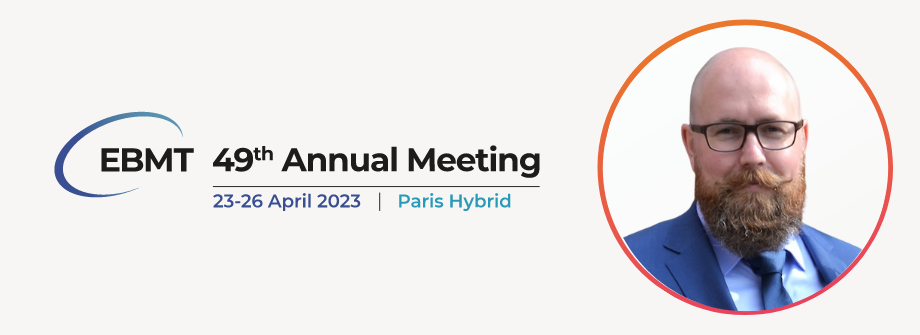
Speaker: Johan de Munter
Time and date of presentation: NG5-05 Nurses Group Keynote Lecture, 9:30-10:00, Monday 24 April in Room 242 AB, (part of Nurses’ Group Opening Session)
Click here for Johan’s profile
The keynote lecture at this year’s Nurse’s Group opening session is on leadership, and will be given by Johan de Munter – nurse manager at the University Hospital Ghent Cancer Center, Belgium, and President of European Oncology Nursing Society. These roles only represent a part of Johan’s extensive experience, which includes various roles in teaching and advocacy. He has worked in the haematology/stem cell transplant unit in Ghent since 2010.
“Leadership in nursing is a crucial element in modern healthcare delivery. As healthcare continuously evolves, there is a growing need for effective nurse leaders to navigate the complexities of patient care and support nursing developments,” he explains. “In the last decades, the concept of nursing leadership has expanded from managing patient care to manage entire healthcare teams and organisations. The role of nurse leaders has become more important than ever in achieving universal sustainable healthcare coverage.”
He will discuss the inequalities in cancer care that sadly remain in 2023, saying: “Unfortunately, cancer healthcare disparities are still out there and refer to unequal access to cancer prevention, screening, diagnosis, treatment, survivorship and end-of-life services among different populations. These disparities can occur due to a variety of factors, such as socioeconomic status, gender, education, race and ethnicity, geographic location, language barriers, and cultural beliefs. “These cancer healthcare disparities are further driven by no (inter)national cancer strategy, no recognition of cancer nursing, zero or insufficient equal access to education and training, inequitable access to innovative care, treatments and cure; the digital divide…and the list goes on.”
He will discuss that nursing is the largest occupational group in the healthcare sector (WHO, State of the World’s Nursing 2020), and how, as forefront healthcare professionals they play a crucial role to tackle these healthcare disparities and optimising overall healthcare outcomes. Therefore, continuous investment in nursing leadership is needed as it also requires a unique set of skills and qualities to make it successful.
“Communication is a vital aspect of leadership in nursing. Effective communication skills are necessary to establish a positive work environment, build relationships, and collaborate with other healthcare professionals and stakeholders,” he explains. “Leaders in nursing should be able to convey complex information in a way that is easy to understand and use their active listening skills to understand current needs from bedside to boardroom.”
Empathy is the ability to understand and share the feelings of others. In whatever role you have in nursing, Johan will state that empathy is critical in building and maintaining relationships. Empathetic nurse leaders can create a supportive work environment and help to reduce burnout, turnover rates and dropout. “When nurse leaders show empathy, they are demonstrating that they value and care about their staff, which leads to greater job satisfaction and commitment,” he says.
Johan will also highlight that critical thinking is also an essential quality of nursing. Nurses must be able to make quick and effective decisions, especially in specialised care and high-pressure situations. Critical thinking allows nurse leaders to analyse information, evaluate options, and make informed decisions where health policy and practice decisions are made to positively impact on patient and healthcare outcomes.
Discussing the unexpected challenges that can frequently arise in health care, Johan says that “nurse leaders must be prepared to troubleshoot and anticipate quickly and efficiently. They need to be able to identify issues, manage risks and prioritise tasks, develop solutions, and implement strategies that address the root cause of problems. Successful nurse leadership includes being creative and adaptable and being able to find innovative solutions to complex problems across the healthcare continuum and ensure that care is delivered in a timely and efficient manner.”
He will also emphasise that nurse leadership is the fulfilling commitment to lifelong learning. Nursing is a constantly evolving field, and leaders need to stay up-to-date on the latest advancements and evidence-based practices. He says they should seek opportunities to expand their knowledge and skills through continuing education, professional development, research and networking. They should encourage early career nurses to do the same and promote a culture of continuous learning and improvement.
Johan concludes: “Leadership in nursing is critical to the success of healthcare organisations and systems. Effective nurse leadership should inspire interdisciplinary teams to deliver high-quality and safe patient care, collaborate with other healthcare professionals, continuously improve their skills and knowledge, and contribute to healthcare policy. By developing and cultivating these qualities and skills in the healthcare sector, nurse leaders can make a significant impact on patient outcomes, staff satisfaction, and the overall success of sustainable healthcare coverage. The best way to build excellent leadership in nursing is to build it together."